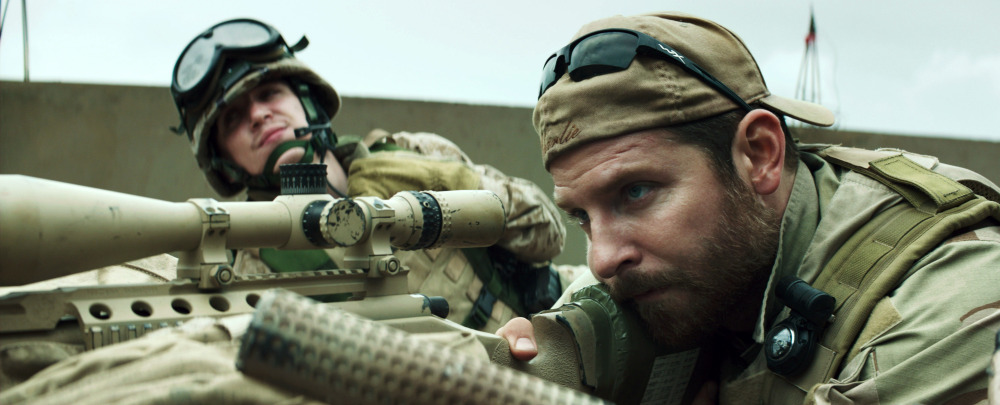The makers of “American Sniper” said they wanted the movie to be a thoughtful character study of the most lethal military sniper in U.S. history.
But the movie – which shattered box-office records over the holiday weekend with $105 million in sales – has also inflamed the debate over America’s controversial wars, with one side decrying it as jingoistic propaganda and another defending it just as fiercely as a paean to the country’s underappreciated veterans.
In West Los Angeles, a billboard for the film was vandalized over the weekend with the word “Murder!” written in red spray paint.
Michael Moore and Seth Rogen took to social media to air their thoughts, though they both later backtracked. Director Moore appeared to slam the glorification of sniper Chris Kyle in the film, writing on Twitter: “My uncle killed by sniper in WW2. We were taught snipers were cowards. Will shoot u in the back. Snipers aren’t heroes.” Rogen compared the movie to a Nazi propaganda movie that appears at the end of Quentin Tarantino’s “Inglourious Basterds.”
The backlash – from politicians, veterans and other celebrities – was swift.
“They aren’t attacking a conservative right of America. They are going after the fabric of America at a time when it is celebrating a hero and when the country needs a hero,” author and former Navy SEAL sniper instructor Brandon Webb said in an interview.
Country singer and veteran Craig Morgan wrote to Seth Rogen on Facebook: “I’m sick and tired of people like you running your mouth when you have no idea what it takes for this country to maintain our freedoms. If you and anyone like you don’t like it, leave.”
The exchanges became the latest flash point to emerge from the country’s divergent assessments of its 13-year military engagement overseas. The movie stirred up a host of questions surrounding the way we treat veterans, whether the wars were worth the immense sacrifice, and how to judge actions taken by soldiers in the heat of battle. The debate also hints at another gulf in American politics: the plummeting number of Americans who serve in the armed services.
The controversy surrounding the film wasn’t the key to “American Sniper’s” initial success, but the heated conversation around it has created a powerful swirl of interest.
“The movie has become more a film that people want to see because they want to be part of the national conversation around it,” said Phil Contrino, a movie analyst at BoxOffice.com.
Twitter said discussion around the film was more than double the volume of the average for films. The hashtag “liberalwarmovies” was one of the highest-trending topics of Tuesday, with conservatives mocking left-leaning critics of the movie for being out of touch with and insensitive to the sacrifices of military. Facebook data showed the film sparked the most active conversations in traditional red states such as West Virginia, Wyoming, Kentucky and Oklahoma.
“American Sniper,” directed by Clint Eastwood and starring Bradley Cooper, was based on the memoir of U.S. Navy SEAL Chris Kyle and his four tours in Iraq between 2003 and 2009.
Kyle was no ordinary soldier. Before he was shot to death at a Texas gun range in 2013, Kyle claimed he killed at least 150 people while working as a sniper in Iraq.
And then there were the tales Kyle told about himself, which came under increasing suspicion after numerous journalists tried – and failed – to corroborate them. Among them: Kyle once said he shot dead two armed Texas thugs who wanted to steal his truck. He said he traveled down to New Orleans and killed 30 bad guys in the chaos following Hurricane Katrina. And he also falsely claimed he punched out former Minnesota governor Jesse “the Body” Ventura after Ventura, a former member of a U.S. Navy Underwater Demolition Team, disparaged the Navy SEALs.
Send questions/comments to the editors.



Success. Please wait for the page to reload. If the page does not reload within 5 seconds, please refresh the page.
Enter your email and password to access comments.
Hi, to comment on stories you must . This profile is in addition to your subscription and website login.
Already have a commenting profile? .
Invalid username/password.
Please check your email to confirm and complete your registration.
Only subscribers are eligible to post comments. Please subscribe or login first for digital access. Here’s why.
Use the form below to reset your password. When you've submitted your account email, we will send an email with a reset code.